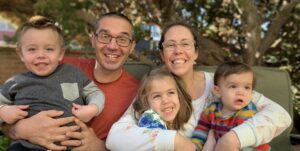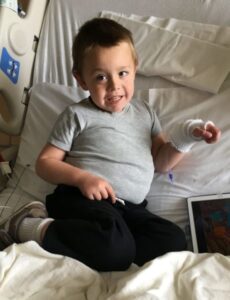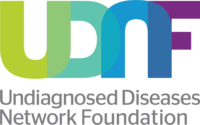25 Jan Meghan Halley
 Posted originally on Once Upon a Gene. Written by Effie Parks.
Posted originally on Once Upon a Gene. Written by Effie Parks.
I met Meghan Halley on the NORD Living Rare Living Stronger planning committee. She co-chairs the patient and family support group for the Undiagnosed Diseases Network. She’s a Stanford research scholar and a mom to her undiagnosed son Philip.
Can you share about yourself?
I’m the mom of three kids and my middle son Philip, who is six years old, is undiagnosed with a rare condition. I’ve become more involved in advocacy as it relates to access to diagnosis for individuals with rare disease, particularly ultra rare. Because Philip is a patient in the Undiagnosed Diseases Network, I became involved in advocating UDN as a resource for the rare disease community. I am a medical anthropologist and a research scholar at the Center for Biomedical Ethics (SCBE) at Stanford University. I do research on the experiences of patients and families with ultra rare and undiagnosed diseases, with a particular focus on how stakeholders involved in providing sequencing have different values and how that determines who has access. Philip is at the core of everything because after three years, he still doesn’t have a diagnosis. 
Why are you advocating for the UDN as a resource?
Philip had several complex medical issues which didn’t fit together and we were introduced to the UDN. It was developed and expanded as the tools of exome and genome sequencing for diagnosis of rare disease was better understood. With the expansion they identified clinical sites and scientists interested in advancing the science of rare disease diagnosis through a case study approach where they worked with patients and families who had clinical indicators, but no genetic diagnosis. I became more involved to support patients and families, but I’ve learned the program will eventually be de-funded and the operation and support of families and patients from the UDN for will be at risk.
How do you embrace the uncertainty of having an undiagnosed child?
I definitely live with uncertainty having a child with complex medical needs with no data to guide us. Managing decision making is the hardest aspect, as well as not knowing what the future holds. Without a diagnosis, we can’t even begin to think about therapies and we don’t have the benefit of connecting with others on research and advancement that others can take advantage of. Being a mom, it’s difficult to maintain normalcy for my other children, find balance and take care of myself through daily life.
What advocacy outcomes are you most proud of?
My husband and I are still a team, my children are happy and thriving. I began by advocating for Philip, but as I’ve forged, pathways have stayed open for other families. I’m proud of what I’ve been able to achieve in getting services for Philip and he’s thriving above and beyond what would probably be expected. I’m still learning from others how to navigate advocacy and I’m excited to keep learning from others who do this work so effectively in the rare disease community. I’m proud to be a part of this community and I’m grateful for the relationships I’ve formed.



